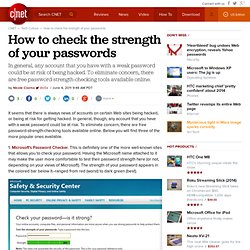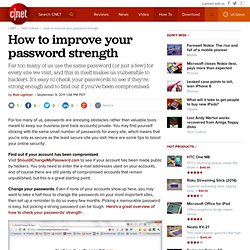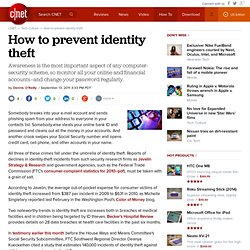

How to check the strength of your passwords. It seems that there is always news of accounts on certain Web sites being hacked, or being at risk for getting hacked.

In general, though, any account that you have with a weak password could be at risk. To eliminate concern, there are free password-strength-checking tools available online. Below you will find three of the more popular ones available. How to improve your password strength. For too many of us, passwords are annoying obstacles rather than valuable tools meant to keep our business (and back accounts) private.

You may find yourself sticking with the same small number of passwords for every site, which means that you're only as secure as the least secure site you visit. Here are some tips to boost your online security: Find out if your account has been compromised. Should I Change My Password? How to prevent identity theft. Somebody breaks into your e-mail account and sends phishing spam from your address to everyone in your contacts list.

Somebody else steals your online bank ID and password and cleans out all the money in your accounts. And another crook swipes your Social Security number and opens credit card, cell phone, and other accounts in your name. All three of these crimes fall under the umbrella of identity theft. Reports of declines in identity-theft incidents from such security research firms as Javelin Strategy & Research and government agencies, such as the Federal Trade Commission (FTC's consumer-complaint statistics for 2010--pdf), must be taken with a grain of salt. According to Javelin, the average out-of-pocket expense for consumer victims of identity theft increased from $387 per incident in 2009 to $631 in 2010, as Michelle Singletary reported last February in the Washington Post's Color of Money blog.